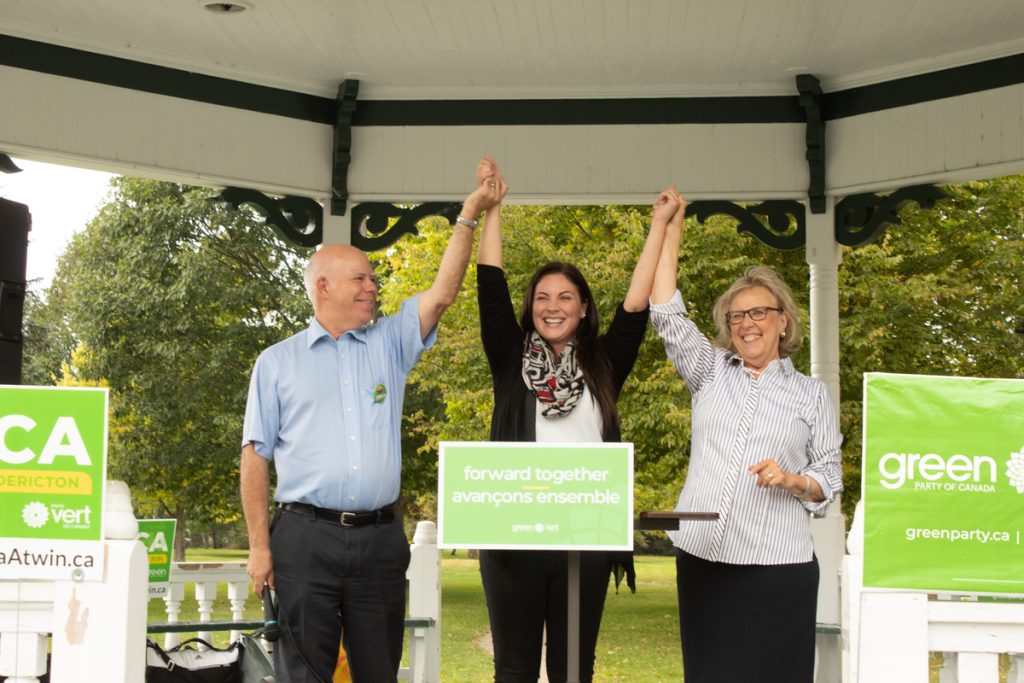“I was blown away.”
Jenica Atwin, the Member of Parliament for Fredericton, describes an overwhelming feeling of support when she remembers her election on October 21 of last year.
“It was so validating for the work that we put in, the goals we have, and the issues we talk about.”
Atwin gained notoriety following her historic election as the first Green MP outside of British Columbia and the first woman elected in the Fredericton riding. She describes a flurry of interviews following her election, and then a shift out of the spotlight, which she welcomed.
“I think people were looking to see, like, what are we actually going to do. Because it’s one thing to win the seat. You actually have to do the work and you have to represent your constituents,” Atwin said.
Adjustment to her role as a parliamentarian was “mind blowing,” said Atwin, recalling the excitement of working with fellow Greens Elizabeth May and Paul Manly, and of sitting next to Jody Wilson-Rayboult in the House of Commons. After those first few months, however, COVID-19 changed the operations of Parliament and the role of an MP drastically.
“Once COVID hits, the reality of the responsibility is even more highlighted,” said Atwin. “You know, people are looking to our office now to help navigate all the different announcements and government programs. Some people were calling with the most heartbreaking stories… So just every issue under the sun was magnified.”
Atwin says her focus switched to “crisis management mode,” and that she is proud of the work done by herself and her team, who were working around the clock in the early months of the pandemic. She feels it has made her a stronger representative.
“We’ve reached a 74 per cent conclusion rate on our constituency files,” said Atwin. “It’s more than I could have expected for us to be able to achieve. These files range from complex immigration cases to solving someone’s miscommunication with EI, as an example.”
Atwin notes accomplishments from this past year, including a change within the House of Commons regulations which no longer requires staff members to identify their gender on registration forms. She says this is a step in the right direction in the conversation of gender equality and gendered language.
Another achievement mentioned by Atwin was an amendment made to Bill C3, which ensures that judges have sexual assault training. The amendment states that the bill will now include Indigenous leadership and representatives in developing the training.
“It’s really about that reconciliation piece that’s so important for me. Once it passes its final stage, it’ll be enshrined in Canadian law to finally have Indigenous peoples involved in some of those judiciary processes and not be an afterthought. So that was a big, big win for us,” said Atwin.
She states that support has come from across party lines on similar cases advocating for marginalized communities, including on issues of mental health, accessibility, and systematic oppression that have arisen from political discourse this past year.
“What COVID did was amplify those issues, and it has allowed us as parliamentarians to really rally around them and to use that lens in a more consistent way when we’re looking at some of the legislation or policy that’s coming before us.”
Atwin says it was encouraging to see Conservative perspectives shifting and supporting anti-racism dialogue and other progressive movements.
Surrounding the issue of the closure of Clinic 554, Atwin recalls consulting local advocates and those involved in the effort, expressing sadness and disappointment that there still has to be a fight around “archaic issues” such as abortion access, LGBTQ+ healthcare, and mental health services such as those offered at the clinic.
“I think it became more clear during all of this as well, these little silos of issues that people are fighting for that we wish we could just really fight together collectively for improvements in our society,” she said. “But we still have those uphill battles.”
Atwin identifies the current housing crisis and mental health issues as the primary concerns raised by Fredericton constituents.
She states that housing is “a right all year around” and mentions coming initiatives surrounding the issue, such as town halls and partnership with local municipalities to ensure access to the new Rapid Housing Initiative funding coming from the federal government.
Atwin holds mental health as the “flagship” of her campaign. She sits on a mental health all-party caucus, tasked with seeking ways to directly fund organizations already doing work to address mental health concerns. Local resources, awareness, and investment are the crucial pieces in her efforts.
Reflecting on her first year in Parliament, Atwin says she is proud that her and her team have been able to “walk the talk,” delivering the promises issued during her initial campaign.
“Every single one of those votes means the world to me. And not only do we want to make them proud but we want to grow that base,” said Atwin. “I want to show people who didn’t select us as their representative that we fight for everyone in this riding, regardless of your political stripe. This is about being New Brunswickers, it’s about being Canadians, and it’s about pushing that positive change in our communities.”
When asked about the challenges this year has brought, Atwin had one thing to say:
“I’m a lot stronger than I thought I was.”




